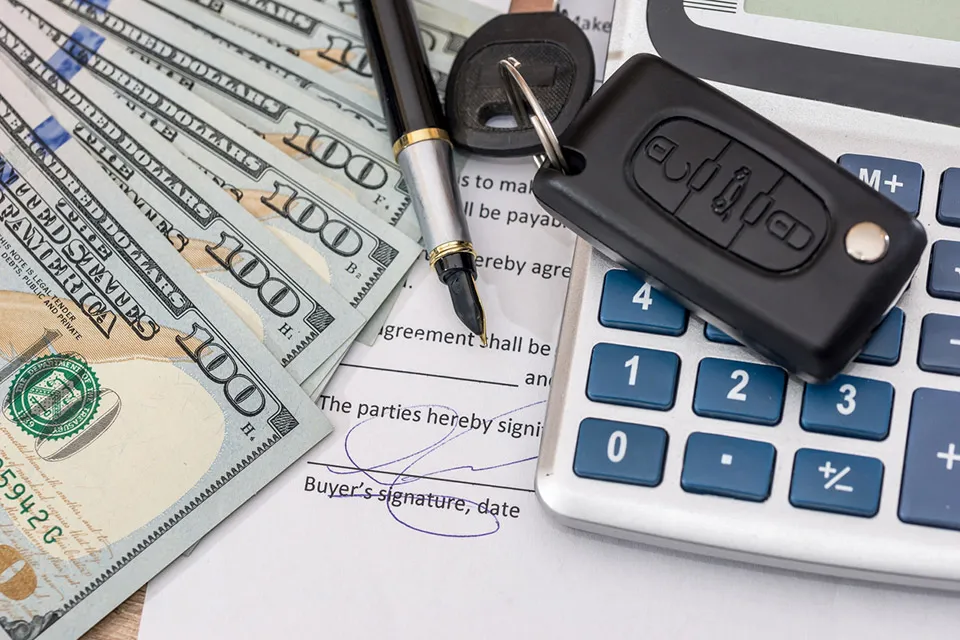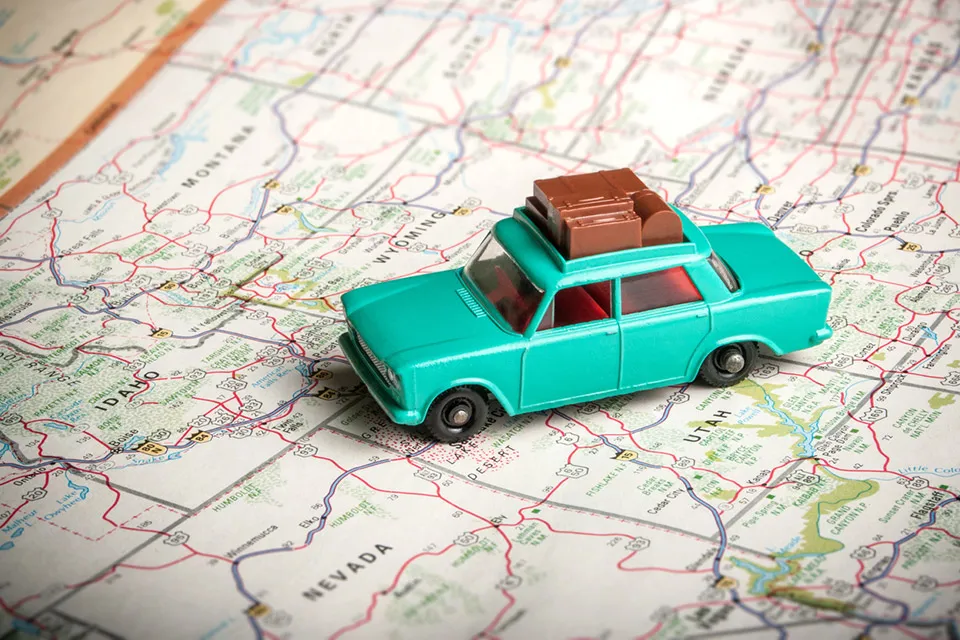- Car Sales Tax: What is it, and How Can It Be Calculated?
- What is The Sales Tax on a Car?
- How Is Sales Tax Calculated On a Car?
- When Do You Pay Sales Tax on a New Car?
- Where Do You Pay Sales Tax on a Car?
- If You Buy a Car Out of State, Do You Pay Taxes Twice?
- Do You Pay Sales Tax on Used Cars?
- Vehicle Taxes By State
Car Sales Tax: What is it, and How Can It Be Calculated?

Understanding how sales tax, use tax, and other fees are applied to owning and using a vehicle is crucial to your budget. These additional costs can inflate the cost of a new vehicle, and they’re nearly impossible to avoid. It’s best to understand and be prepared for them.
What is The Sales Tax on a Car?
Buying a new or used vehicle can be intimidating. Dealerships have traditionally used this to their advantage, including by not revealing the true price of a car or offering the same vehicle at different prices to different customers. To compound the confusion, state-imposed tax, title, and licensing fees are unclear to many buyers despite adding a significant amount to the cost of a vehicle in most states.

The average cost of a vehicle in the U.S. is about $46,000, so states with a 6 percent sales tax collect about $2,760 on each new car sale. California, which has a sales tax of over 7 percent, collects more than $8 billion in new vehicle sales taxes annually.
Buying a vehicle in a state that doesn’t have car sales tax isn’t a real saving either, as your home state will collect sales tax when you register the vehicle there. Even after you purchase a car and pay the sales tax there are additional taxes and usage fees that will arise.
How Is Sales Tax Calculated On a Car?
To calculate the amount of car sales tax due on a car purchase, multiply the car price by the state sales tax rate. There may be other factors involved in calculating the sales tax, including trade-ins, rebates, and local taxes.
Trade-ins are when you return a used vehicle to a dealer in exchange for a reduced price on another car. Some states will subtract the trade-in amount from the cost of the new vehicle before applying car sales tax to the remaining amount, but that may vary from state to state.
Car sales taxes are defined by who collects the fee at the time of the sales transaction. There are two types of sales taxes:
Use taxes are reserved for special circumstances, such as when sales tax is not collected. These taxes come in two forms:
There are five states that do not charge sales tax when buying a car:
All sales taxes are calculated by taking the purchase price of the item and multiplying it by the tax rate. That means a common 6.25 percent sales tax on a $40,000 vehicle is $2,500. If you live in California, Chicago, or another location with local taxes, they are added to the state taxes collected. In Los Angeles, that means you’ll pay the state sales tax rate of 7.25 percent in addition to local tax, which adds 1-3 percent according to the specific location. If you live in central San Francisco, your effective state and local sales tax rate is 8.625 percent.
The states with the highest combined state and local taxes are:
- Louisiana, with 9.56 percent
- Tennessee, with 9.55 percent
- Arkansas, with 9.45 percent
- Washington, with 9.38 percent
- Alabama, with 9.29 percent
When Do You Pay Sales Tax on a New Car?
There are different types of car sales, and each one has an impact on how sales taxes are collected and paid. The most common type of sale is a private party sale, where two individuals agree on a price and sell the car between themselves. In this situation, any sales tax required by the state is paid by the buyer at the time the vehicle is registered rather than collected by the seller. Local taxes, if any, may be billed when the registration is received by the state.
Another type of sale is a dealer sale in which a car is sold by a licensed dealership. These sales are subject to state sales tax, as well as any applicable local taxes, and all are usually collected at the time of the sale (under the guise of tax, title, and licensing fees). For instance, any car sales in Chicago must pay the state’s 6.25 percent sales tax and an additional 1 percent for the home rule use tax.
Where Do You Pay Sales Tax on a Car?

When buying a new vehicle from a dealer in a state that collects car sales taxes, the taxes are paid by the buyer when the purchase is made. Dealers call this the “tax, title, and licensing” phase of a purchase, and it usually takes a few days for a vehicle to be ready with a license plate and documentation.
When a vehicle is sold by an individual to another person, the sales tax is collected by the Department of Motor Vehicles when the vehicle is registered.
If You Buy a Car Out of State, Do You Pay Taxes Twice?
Most states have a use tax in place to ensure that everyone pays their fair share of taxes on car purchases, even if no sales tax was charged at the time of purchase (such as purchases made in a state without sales tax). This is especially important for items purchased out-of-state or online, where retailers may not be required to collect sales tax. In these cases, consumers are still responsible for paying use tax to their state.
If you buy a vehicle out of state, you may pay taxes twice – but the most you will pay is the rate that applies to your home address. That means if you live in California, where the car sales tax is 7.5 percent, but buy a car in Nevada, where the sales tax is 4.6 percent, you will have to pay the difference, 2.9 percent, when you register the vehicle in California (plus any additional local taxes).
Do You Pay Sales Tax on Used Cars?
Car sales taxes are collected on all vehicle sales in states where sales tax applies. Even if you buy a cheap old car from a neighbor, the state will collect sales tax when you register it.
Vehicles that are given as gifts may be exempt from sales tax (if you have proper documentation) or subject to a small gift tax. Gift taxes may be a set amount or based on the vehicle’s fair market value. Some places, like Florida, do not impose any gift tax, which means that people can give vehicles away for free at any time.
Vehicle Taxes By State
Taxes on a new car vary by state and even within states. It’s almost impossible to avoid paying taxes on a car purchase, including by going to a state that doesn’t have sales tax. Use the map to find your state’s Department of Motor Vehicles and sales tax information.
Knowing your state’s sales tax amount will help you decide on a vehicle purchase and understand how discounts or rebates may affect those costs. Taxes are collected to support state services such as law enforcement and road repairs, as well as schools.
- Car Sales Tax: What is it, and How Can It Be Calculated?
- What is The Sales Tax on a Car?
- How Is Sales Tax Calculated On a Car?
- When Do You Pay Sales Tax on a New Car?
- Where Do You Pay Sales Tax on a Car?
- If You Buy a Car Out of State, Do You Pay Taxes Twice?
- Do You Pay Sales Tax on Used Cars?
- Vehicle Taxes By State
FREE Vehicle Search
- Accidents
- Problem Checks
- Title Records
- Recalls
- Values
- Specs
-
InfoPay, Inc. (dba GoodCar) is an Approved NMVTIS Data Provider
-
-































